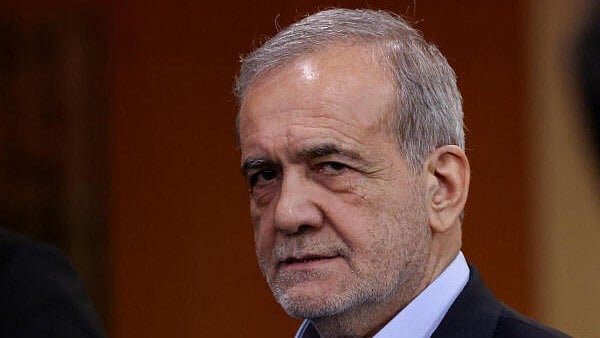
Iran's President Masoud Pezeshkian
Credit: Reuters Photo
United Nations: In his first address to the UN General Assembly on Tuesday, the new president of Iran, Masoud Pezeshkian, said he was elected to steer Iran into a new era of domestic reform and constructive global engagement with the world and he did not seek war or tension with any country.
“The Islamic Republic of Iran seeks to safeguard its own security, not to create insecurity for others. We want peace for all and seek no war or quarrel with anyone. We seek lasting peace and security for the people of Ukraine and Russia,” Pezeshkian said.
Pezeshkian’s speech was unusually reconciliatory in tone and words. In the past, Iranian presidents have used the global platform of the Assembly to project defiance, and have threatened to take revenge on American presidents and denied the Holocaust in their speeches.
Instead, Pezeshkian extended an olive branch to Iran’s Western adversaries, with the exception of Israel. To what extent his rhetoric will match Iran’s actions remains to be seen.
The Iranian president praised Iran’s nuclear deal with the West as a diplomatic achievement and said Iran was ready to engage in negotiations with all sides to return to the deal and lift US sanctions.
He said once that hurdle is overcome, “fully and in good faith, dialogue on other issues can follow.”
Still, analysts said that Pezeshkian’s peace message did not match the country’s actions on the ground, where Iran’s powerful Revolutionary Guard supports and arms militant groups like Hamas in the Gaza Strip, Hezbollah in Lebanon, the Houthis in Yemen and militias in Iraq and Syria. These groups have been launching attacks on Israel, US military bases and, in the case of Houthis, ships on the Red Sea.
On Oct. 7, Hamas invaded Israel from Gaza, killing roughly 1,200 people, including women and children, according to Israeli authorities, and taking more than 200 hostages.
Iran has denied that it supports Russia in its war against Ukraine. But Western officials say that the country has been supplying Russia with drones, which the Kremlin has used against targets in Ukraine for more than a year, and that Iran recently delivered short-range ballistic missiles to Russia.
When it came to Israel, Pezeshkian took a harsher stand but stopped short of directly threatening the country.
Like many world leaders who spoke at the Assembly, Pezeshkian slammed Israel for what he called “atrocities in Gaza”; the wave of recent attacks in Lebanon that have killed hundreds of people; and a covert war with Iran assassinating its nuclear scientists, diplomats and “guests on our soil” — a reference to the killing of Hamas’ leader, Ismail Haniyeh, in Iran.
Pezeshkian defended Iran’s support of the militant networks known as the “axis of resistance” in the Middle East, which have taken up arms against Israel, including Hamas in Gaza and Hezbollah in Lebanon. He called the networks “popular liberation movements of people that have been victims of four generations of the crimes and colonialism of the Israeli regime.”
Pezeshkian, a heart surgeon, is a reformist who won the election in July against a conservative candidate. Iran’s supreme leader, Ayatollah Ali Khamenei, who has the last word on all state matters, has endorsed Pezeshkian and called on all government branches and political factions to cooperate with him.
“He has a really difficult balancing act to put on display in New York, because a lot of the priorities he is pursuing are mutually exclusive,” Ali Vaez, the Iran director for the International Crisis Group, said of Pezeshkian. “He wants to improve relations with the West when Iran is on the opposite side of the West in the wars in Gaza and Ukraine.”
Pezeshkian called on the international community to immediately bring a cease-fire in Gaza and “bring an end to the desperate barbarism of Israel in Lebanon, before it engulfs the region and the world,” saying that aggression with thousands of victims “cannot go unanswered.”
In April, after Israel struck Iran’s Embassy in Damascus, Syria, Iran retaliated by launching hundreds of drones and missiles against Israel. And Iran vowed revenge after Israel assassinated Hamas’ political leader, Haniyeh, but after intense diplomatic efforts, military commanders said Iran would retaliate at a time and place of its choosing.
Pezeshkian said he had a message for the American people: “We have the opportunity to transcend these limitations and enter a new era. This era will commence with the acknowledgment of Iran’s security concerns and cooperation on mutual challenges.”